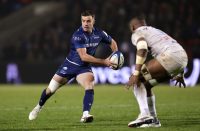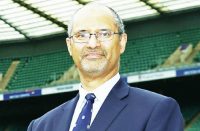 One of the enduring conundrums of Stuart Lancaster‘s tenure, and that of many England coaching regimes before his, is whether Red Rose players get sharper the longer they are in national training camps, or duller.
One of the enduring conundrums of Stuart Lancaster‘s tenure, and that of many England coaching regimes before his, is whether Red Rose players get sharper the longer they are in national training camps, or duller.
With the England squad announced this week about to spend longer in camp than any other, making the transition from training to tournament matches with an edge that is skinning-knife keen will be crucial to their chances of becoming world champions.
The players will be available to Lancaster and his coaches for an unprecedented five months, if you include the six week World Cup span, and the England head coach accepts that it gives them an unrivalled opportunity to get players to peak at the right time for their country.
“This is the one opportunity where you can. So, there are no excuses in that regard. We have them from June until the end of the tournament (October 31)…. and we are at a place now whereby the trust between us and the clubs is so strong that the best players will get managed appropriately…”.
As our front page story reveals, Lancaster is determined to push the boundaries where fitness is concerned, and that is why the first training month will involve very little rugby. He explained: “The players are in very good condition at the moment, and they will have a bit of a break. But, it would be daft if they had too much because when it comes down to the 50/50 calls it could be down to something as simple as who’s the fittest.”
However, questioned about whether a 50-man squad was too unwieldy to optimise on the training opportunities on offer– as Sir Clive Woodward discovered with his 45-man squad on the disastrous 2005 Lions tour of New Zealand – he was unfazed.
Lancaster pointed to England’s tour of New Zealand last summer as an exercise in good practice, irrespective of the fiasco handed to him by the RFU of the test schedule clashing with the Premiership final.
“It worked okay last year when we took 46 players to New Zealand. We managed that well. All the players felt they got good development and preparation, plus good feedback. You have to remember that in the 45 (who go to Colorado) not all will be training. I already know that. Ben Morgan will have a staggered return, Joe Marler will be doing his final rehab etc, so there are bound to be players unavailable to train. So, it’s not always what it seems.”
However, the counter-argument that the tour, and its management, were not as successful as Lancaster suggests, is backed up by a 3-0 reverse in the Test series. Furthermore, England were at their least competitive in the final Test in Hamilton, which they lost 36-13, suggesting that familiarity does not always result in heightened performance. There were also rumblings that the off-field tour environment was too restrictive.
 The reality was that England came up short in their attempt to match NZ’s high-tempo game, and in many respects returned with dented confidence. This was especially the case in midfield, where the Six Nations pairing of Billy Twelvetrees and Luther Burrell misfired in the second Test, with Manu Tuilagi inexplicably exiled to the wing. To make matters worse, Kyle Eastmond was hung out to dry in the third Test by poor defensive organisation.
The reality was that England came up short in their attempt to match NZ’s high-tempo game, and in many respects returned with dented confidence. This was especially the case in midfield, where the Six Nations pairing of Billy Twelvetrees and Luther Burrell misfired in the second Test, with Manu Tuilagi inexplicably exiled to the wing. To make matters worse, Kyle Eastmond was hung out to dry in the third Test by poor defensive organisation.
Those details aside, Lancaster gave a cogent answer to the man-management problems posed by having such a large initial World Cup squad. He also outlined how it would be trimmed from 50 to 45 players for the high altitude training in the American Rockies, above, in July, before the big reduction to 36 ahead of the first warm-up Test against France on August 15th, with the final cut to 31 made by the August 31st deadline.
Lancaster said that the keys to harmony and focus is being honest with players so that their expectations are managed fairly. “The trick is to set the expectations early. When we come into camp (in June) I’ll meet all the players one-to-one. I will give them a very honest assessment of where they are in the pecking order in relation to their position. I think you get problems when people don’t know where they sit and you are not being honest with them.”
He added: “You set their expectation up in that first meeting, and if it’s a player who is your number one you say you have to work hard to maintain that position. If it’s a player on the cusp of the 31-man squad you’re going to say to him, you’re on the edge here. You will need x, y and z to make it. Likewise, if the player is a long way away from it you tell them they have a lot of work to do, and then, if and when he doesn’t make the World Cup squad, at least his expectations have been prepared for him.”
Lancaster unveiled the logistical map he has prepared. “We need to get it down to 36 before that first France game, but by then we will have had three weeks at Pennyhill Park, two weeks in Denver, and probably another week before we play France. So, there will be plenty of opportunity for people to put their hands up.”
He said the selection process will also be as transparent as possible: “The first home game (against France) will probably be players who we consider to be the second-choice in their positions, or are on the fringe of the 31-man squad, who we want to give a final chance to. Let’s say we have three wingers who we want to pick for the World Cup squad but we still have five left in camp. Probably the number four and five wingers will start that game. Then at the end of that week you’ve either done it or you haven’t.”
By that time Lancaster said the 31 will be defined. “The second game (against France) is what you call your number one team, and that team will stay together and play the Ireland game.”
Lancaster said that his experience of being in New Zealand as an RFU observer in 2011 and understanding what went right, and wrong, had helped him to prioritise.
“Putting together the context for the camp on June 22 and the lead-up for the World Cup, and getting it right, is crucial. We don’t want to do the rugby too early, and we have to make sure the commercial dynamic fits into the equation. We make sure we get selection right, the timing of the communication right, and the warm-up games have to be the right quality.”
He continued: “The balance between fitness, rugby, conditioning, and team-building are all things that you have to factor in the equation. And, ultimately, you have to be in such good shape that when the World Cup comes around, and the scrutiny inevitably comes on, you hold together under pressure. That comes back to the culture of the team – and if your culture is strong, you will not split under pressure.”
However, as Lancaster outlined his plans in a red-carpeted conference room in Twickenham‘s South Stand complex, he also acknowledged the magnitude of the task ahead given England’s battle to get out of by far the most competitive pool in the tournament.
Asked whether finishing power and points difference in Pool A against Fiji and Uruguay will be a decisive factor in deciding which two from England, Wales and Australia will progress to the quarter-finals, Lancaster was momentarily less sure-footed.
He accepted how fraught with pitfalls it could be. “Let’s hope it doesn’t come to that. It would be nice to go into that Uruguay game three from three, so let’s hope we are in that position.” Unsolicited, he volunteered: “Without doubt not finishing off opportunities in the Six Nations cost us. While I’d had been disappointed if we hadn’t created any (opportunities), or taken the ones we did create, to lose the Championship by six points…we scored 18 tries, which is more than any team has for a long time, but we probably should have scored 24.”
A similar profligacy in the opener against Fiji, or their last game against Uruguay, and World Cup armageddon beckons. As he contemplated those pool matches, Lancaster said it is probable that his selection base will shrink from 31 down to 25.
“Other teams will probably rotate their squads early, but we don’t get that luxury in the pool stages. You have to play your number one team for the Fiji game, the Wales game and then Australia. So we may have a dynamic whereby, from a 31-man squad with everybody excited to get in it, only 24-25 players are used in the first three games. Then you could be sat before the Uruguay game thinking we need to get as many points as we can. That is another thing that has gone through my mind. But there is no avoiding that because of the nature of the Pool that we are in. You would be foolish to not play your number one team each week.”
It is little wonder that it has gone through Lancaster’s mind, because it means that the work-load on his 25 first-choice players will be unrelenting through seven consecutive weekends to get to the final. And then, against quarter-final rivals who will almost certainly be far better rested, somehow England will have to summon the cut-and-thrust to win it.























